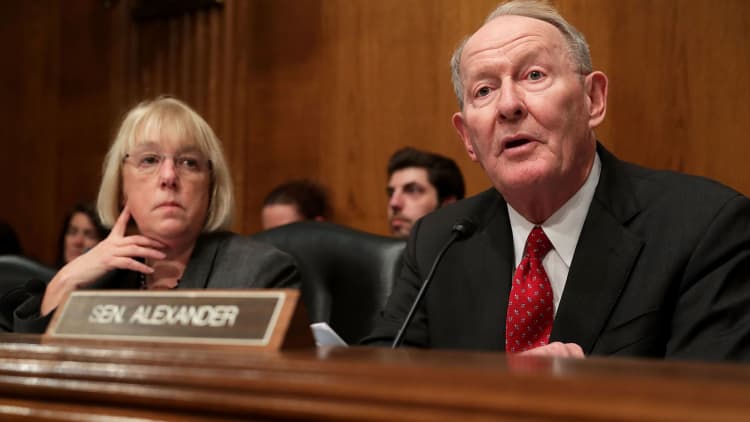
Republicans in Washington have reached a new moment of truth on Obamacare — and not about whether they can repeal it.
This time, it's about whether an all-Republican government can accept political limits, allow bipartisan compromise and protect citizens from harm.
Repealing and replacing Obamacare has been the top priority of Republicans for years. After Donald Trump captured the White House, it became the first order of business for the Republican-led House and Senate.
The effort proceeded on two tracks. The Trump administration sought to undercut confidence and destabilize Obamacare markets, which, in turn, GOP lawmakers used to affirm arguments for repeal.
Still, they failed — repeatedly.
They had the Republican president they needed. But the chasm separating their promises from their policies, and the realities of eliminating a program that gave 20 million more Americans health insurance, rallied political opposition they could not overcome.
Yet while they were failing, two senior senators negotiated a bipartisan backup plan.
One is Patty Murray of Washington, ranking Democrat on the Senate health committee. With the two parties in budget stalemate under President Barack Obama, she negotiated a compromise with then-House budget chairman Paul Ryan in 2013.
The other is Lamar Alexander of Tennessee, a former Republican governor, presidential candidate, Cabinet secretary, member of the Senate leadership and now health committee chairman.
Their deal accepts that Obamacare will remain law for at least the next two years. It gives states more flexibility for experimentation and allows the sale of more inexpensive "catastrophic" plans.
Most importantly, it would assure two years of federal "cost-sharing reduction" payments to insurers. Those payments, which cost the government $7 billion last year, let insurers reduce out-of-pocket Obamacare costs for low-income Americans.
Last week, the Trump administration had announced it would end the payments. The president denounced them as a Democratic "payoff" to insurance industry allies.
In reality, however, those payments protect millions of the working-class voters candidate Trump won over in 2016. Without them, the Congressional Budget Office estimates, more insurers would flee Obamacare marketplaces, while those remaining hike premiums 25 percent by 2020. The CBO also projects a $21 billion rise in the deficit, since lost insurer subsidies would lead to higher Obamacare tax credits.
The president struck a radically different tone Tuesday as news of the Alexander-Murray agreement broke. While insisting against all evidence that Republicans will repeal Obamacare soon, he embraced the deal.
"It will get us over this intermediate hump," Trump told a Rose Garden news conference. "It's a short-term solution so we don't have this dangerous little period … for insurance companies for one or two years."
In fact, in a weekend phone call to Alexander, the president privately encouraged the bipartisan negotiations even while blustering publicly.
"He said he doesn't want people to be hurt during the next two years by the possibility of rising premiums or not being able to buy insurance," Alexander told reporters.
The question now is whether other Republicans take yes for an answer.
After Trump spoke, some White House aides suggested additional Alexander-Murray negotiations. A group of House GOP conservatives announced they'll oppose insurer "bailouts."
"From what we've been told, there's very little real reform," Rep. Bradley Byrne of Alabama told me. "I don't think this is going to fly."
If it doesn't, Republicans will extend the Obamacare fracas into an eighth year — with no prospect of more success. They will fuel more insurance market turmoil just as they want to start debating tax-cuts.
Like Trump, GOP members are squeezed between an anti-government base and a broader electorate seeking solutions. Unlike him, they'll be on the ballot in next year's midterm elections.
In the name of Obamacare marketplace customers — including 350,000 Tennesseans — former Gov. Alexander wants his colleagues to govern.
"We've been stuck for seven years on individual market health care insurance," he said. "That only affects about 6 percent of Americans, but every one of them is important."


